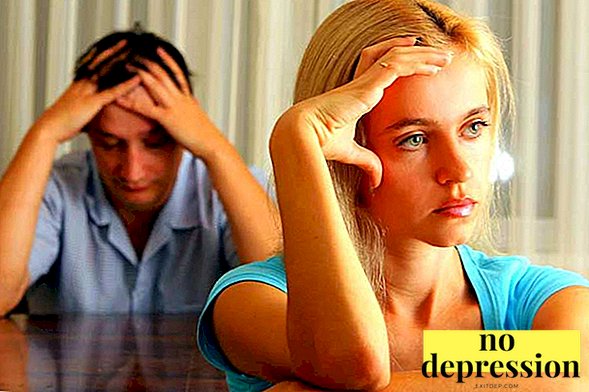Every drug has side effects and some of them are capable of seriously undermining human health or even cause a fatal outcome.
Neuroleptics (or, in other words, antipsychotics), used primarily for the treatment of severe mental disorders, also have an extensive list of possible side effects, the most dangerous of which is a neuroleptic malignant syndrome.
What it is?

Neuroleptics - drugs that are able to alleviate or completely eliminate the main symptoms observed in psychotic disorders: delusions and other thinking disorders, hallucinations, pseudohallucinations, behavioral disorders, pathological aggressiveness, mania.
Most often classic antipsychotics assigned at:
- schizophrenia;
- various psychoses;
- schizoaffective disorder;
- delirium;
- severe neurological disorders;
- withdrawal symptoms associated with taking alcohol or drugs.
Also neuroleptics especially atypical, can be used in the treatment of severe forms of depression, with neurosis, anxiety disorders, autism, depersonalization and derealization, episodes of mania with bipolar disorder.
In small doses, they can be prescribed as a remedy for insomnia and other sleep disorders, in the treatment of various side effects of radiation therapy and chemotherapy.
The first antipsychotics, such as Haloperidol, have a more extensive list of side effects that can significantly impede the functioning of a person, since they strongly affect cognitive functions, cause inhibition.

Modern antipsychotics, especially atypical, much less likely to cause pronounced side effects.
Neurolepsy - A condition that can occur in people taking antipsychotic drugs.
A person in this state feels very relaxed, inhibited, his emotions are almost absent. Often these sensations are complemented by other side effects of antipsychotics; extrapyramidal disorders may occur.
Neurological disorders that occur under the influence of antipsychotic drugs are combined into a term called “neuroleptic syndrome”, in which several types are distinguished. One of them is neuroleptic malignant syndrome.
Malignant Neuroleptic Syndrome - not too common pathology. It is detected in the order of 0.1-3.2% of people taking antipsychotic drugs, and is able to develop while taking absolutely any antipsychotic, even modern and fairly safe.
But the likelihood of its development is much higher when taking strong classic antipsychotics, such as haloperidol. Atypical antipsychotics provoke the development of ZNS much less.
The main symptoms of ZNS affects both the somatic and mental spheres. This condition is extremely dangerous, since the probability of dying even with timely medical care provided is 10-12%. Decades ago, the death rate was three times higher.
There is also another serious disorder that can occur while taking antipsychotics: neuroleptic deficiency syndrome. Like the previous pathology, it is more often caused by classic (typical) antipsychotics.

Violations come to the fore affecting cognitive and behavioral areas: suffer volitional qualities, thinking, attention, ability to function in society.
If you do not take timely action, pathological changes may become irreversible.
In contrast to the ZNS, VAT occurs very often: about 80% of patients taking antipsychotic drugs belonging to the group of "typical", are faced with certain manifestations of this side effect.
Causes of pathology
Neither the neuroleptic deficiency syndrome nor the neuroleptic malignant syndrome has been adequately studied by specialists, but there are several assumptions based on analysis of the physiological effects of antipsychotics.
The main hypotheses explaining the causes of malignant neuroleptic syndrome:
- Occurrence of abnormalities in dopamine metabolism. Neuroleptics reduce the sensitivity of dopamine receptors, which leads to increased muscle tone. This causes a rise in temperature and a strong increase in metabolic processes.
The remaining symptoms of NNS are also explained by the specific effect of antipsychotics on serotonin and dopamine receptors.
- Effect of antipsychotics on skeletal muscle. Drugs, provoking dopamine blockade on the periphery, increase the frequency of muscle contractions, which leads to the appearance of symptoms of MNS. It is assumed that this effect is associated with the genetic characteristics of the patient.
Increase the likelihood of developing ZNS following factors:
- taking "typical" neuroleptics in high dosages;
- improperly selected (too high) dosages of antipsychotics;
- lack of specific assistance in the development of neurological (especially extrapyramidal) disorders;
- the patient has experience of undergoing electroconvulsive therapy;
- excessive humidity and too high a temperature in the room where the patient is located;
- dehydration (very often leads to the development of this complication, it is therefore important that patients receive enough liquid);
- various types of exhaustion;
- endocrine diseases;
- the patient has allergies;
- infectious diseases;
- history of catatonic syndrome;
- chronic alcohol intoxication.

Neuroleptic deficiency syndrome develops, according to the researchers' assumptions, due to excessively strong blocking of dopamine receptors with antipsychotic drugs in different areas of the nervous system.
Factors that increase the likelihood of VAT:
- taking neuroleptics that can act too strongly on dopamine receptors and too little on serotonin receptors (aminazine, risperidone, triftazin);
- improperly selected (excessively high) dosage.
Medications designed to reduce the effects of neuroleptics and administered with them, able to increase the severity of symptoms VAT.
Symptoms and signs
The main symptoms of neuroleptic malignant syndrome:
- Muscular rigidity. The patient's muscles are very tense, with passive movement, resistance is felt (its severity is individual). This symptom appears first, sometimes at the same time the body temperature rises.
- Increased body temperature. Usually located between 38.5 and 42 degrees. In rare cases, the patient's body temperature below the specified indicators. Cases were recorded in which the temperature was kept within the framework of the physiological norm (36.6). In the morning the temperature is higher than in the evening.
- Other extrapyramidal disorders. The following disorders are characteristic of neuroleptic syndrome: tremor of the extremities, various nervous tics, epileptic seizures, swallowing disorders, increased segmental reflexes, nystagmus.
- Violations of the cardiovascular system. Patients have various heart rhythm disturbances, blood pressure imbalances (systolic rates at the onset of the disease are elevated, and with the progression of the pathology they drop significantly, causing the development of collapse).
- Other somatic symptoms. The patients' skin is pale, excessive sweating is observed, the tongue is coated, the mucous membranes are dry, the skin is inelastic (if you pull the skin off or press on it, it will keep the shape of the fingers for a while). Urinary retention is possible, incontinence is also observed. Short and shallow breathing.
There is a high probability of joining bullous dermatitis (10-15%, in other sources - 30-50%).
- Mental symptoms. In MPS, mental disorders can take many forms. Characterized by confusion, delirium, oneiroids, catatonia. The degree of dullness of consciousness varies, depending on the severity and stage of the disease. Catatonic symptoms are very common in MNS and are one of the main symptoms.

If the patient does not receive proper care, high probability of death.
Symptoms of neuroleptic deficiency syndrome:
- lethargy, apathy;
- lowering volitional abilities;
- reduction in the amount of mental energy (low or zero productivity, lack of desire to do something, pronounced problems with concentration);
- emotionlessness;
- inhibition of thinking;
- a significant decrease in the speed of speech, movements;
- complaints of feeling that there is emptiness in the head;
- memory problems;
- violation of intelligence in general;
- loss of interest in activities that were previously important;
- loss of desire to communicate, due to which loss of social experience follows;
- drowsiness;
- desire to rest and sleep a lot;
- depersonalization, derealization;
- other side effects of antipsychotic therapy: symptoms of depression (depression, bad mood, feeling that everything is meaningless, suicidal attempts are possible), irritability, sleep disorders, neurological disorders.

The severity of symptoms depends on the type of antipsychotic and dosage.
Effects
The main danger of neuroleptic malignant syndrome - Increased probability of death of the patient (as indicated, it is 10-12%, according to other sources - 5-10%, but may increase, depending on how quickly the patient will receive help and whether it will receive it at all).

Death comes from pathological conditions that have developed on the background of the syndrome (renal, cardiac, respiratory, liver failure, various heart complications - heart attack, unexpected cessation of cardiac activity, rhabdomyolysis, the effects of bullous dermatitis).
Some patients who have experienced ZNS, there are brain abnormalities: cognitive abilities worsen, various neurological disorders are observed.
If you do not start treatment for neuroleptic deficiency syndrome in time, the symptoms observed in the patient will persist and will partially remain even after the withdrawal of antipsychotics, therefore it is important to consult a doctor as soon as possible.
Treatment
The basic principles of the treatment of ZNS:
- Discontinuation of neuroleptics. This is the basis of treatment of ZNS. Treatment must take place in the hospital: in intensive care or in the intensive care unit.
- Symptomatic treatment. The patient is shown medicines and procedures that alleviate his condition and are dependent on symptoms: drugs to reduce body temperature, means that restore normal heart rhythm, control blood pressure, and so on. Neuroleptic correctors are used to eliminate neurological symptoms. Plasmapheresis, forced diuresis, is used to remove the patient’s antipsychotics from the patient’s body. For the elimination of some mental symptoms are assigned benzondiazepines.
- Supportive care. Monitoring vital signs, conducting activities that prevent the occurrence of pressure sores and pneumonia. It is imperative that the patient receive enough fluids (usually patients are given droppers on a regular basis), since dehydration in this pathology can significantly increase the likelihood of deterioration. Also, the patient should receive high-quality food.

For elimination of dopamine blockadeleading to the development of the syndrome, prescribe such medications as bromkriptin, dantrolen. However, resort to these tools is not in all cases.
The main method of eliminating neuroleptic deficiency syndrome is the replacement of neuroleptics, their cancellation or the selection of a more suitable dosage.
Also, if a patient takes several antipsychotics at once, some of them are canceled, leaving one.
To mitigate the symptoms observed with VAT, can be assigned antidepressants. Patients who experience difficulties with socialization may need psychotherapeutic treatment.
Prognosis and methods of prevention
If a patient with neuroleptic malignant syndrome quickly received medical care, favorable prognosis. Much depends on the characteristics of the syndrome, the general health of the patient, the level of medical care.
When neuroleptic deficiency syndrome prognosis mostly favorable: even in patients who have taken high doses of typical antipsychotics for years, certain improvements are observed after a change in therapy.
But the most positive prognosis will be if the patient is changed as soon as possible.
Prevention of ZNS and VAT:
- careful selection of neuroleptics and dosage;
- careful observation of the patient's condition;
- antipsychotics are taken strictly in the dosages indicated by the attending physician;
- in case of specific symptoms, an immediate appeal to a medical institution.

If the patient has already had an SNS, the probability that he will re-developrises. Therefore, it is important to carefully select new drugs and monitor the patient's condition, especially in the first week of treatment.
You can learn about neuroleptic syndrome from the video:



